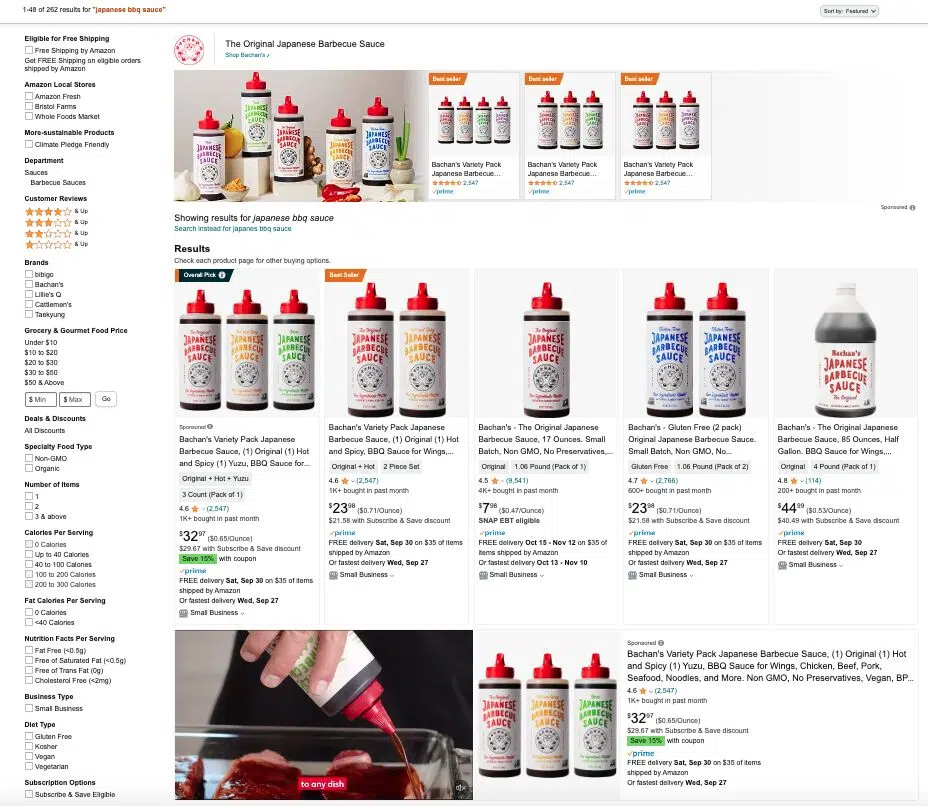5 reasons Amazon Ads is better than Google Ads for ecommerce
Nine out of 10 ecommerce businesses I’ve come across have run Google Ads at some point, but few have considered Amazon Ads despite the significant opportunities it offers.
I believe that Amazon Ads has the potential to be far more effective than Google Ads for ecommerce PPC as it offers higher quality traffic, higher conversion rates, easier tracking, more long-term value and more lenient policies.
In this article, I unpack these advantages and explain why your ecommerce business should be running Amazon Ads over Google Ads.
Why is Amazon Ads undervalued?
There are several reasons that Amazon Ads has not been as popular as Google Ads, even for ecommerce businesses. Let’s get these out of the way.
While Google commands the majority of global search engine usage, boasting over 90% market share, a 2021 survey by Jumpshot revealed that Amazon’s search volume comprises 54% of all product-related searches in the United States.
Google may have a broader reach, but Amazon provides a more relevant targeting opportunity, a nuance often missed by ecommerce advertisers.
Another blocking factor is that Amazon is a stand-alone ecommerce platform. To list a product on Amazon, advertisers are required to invest in the Amazon ecosystem and build a product listing.
The startup cost and learning curve with Google Ads are lower as traffic can be run directly to your ecommerce website. It’s not widely known that Amazon has a program called Fulfilled by Merchant (FBM), where sellers can fulfill products themselves and not use Amazon’s fulfillment centers.
While there might be hesitation to join the Amazon marketplace, the advantage in building another sales channel and gaining access to Amazon’s network of customers and their ad platform is huge.
Lastly, the costs associated with Amazon Ads on face value appear higher than Google Ads. Amazon Ads, like Google Ads, is a CPC platform, which means advertisers are charged for each click on their ads.
However, Amazon also charges a percentage sale commission for any product sold on their platform. This commission varies depending on the product parameters.
Despite this added commission, Amazon Ads is still likely to be more cost-effective than Google Ads, considering that the CPCs are far lower and the conversion rates far higher on Amazon.
1. Amazon has higher conversion rates
Most U.S. product searches happen on Amazon, resulting in significantly higher conversion rates than Google Ads.
While Google Ads offers effective targeting capabilities, Amazon’s advantage lies in its product-focused intent.
Additionally, Amazon provides advertisers with other tools, like advertising products on competitor product listings.
It’s not uncommon for Amazon listings to have conversion rates of 10 to 15% and beyond. Prime members have even higher conversion rates. Compare this to Google Ads, which usually have conversion rates under 5%.
Even considering the 15% commissions on products, the ROAS from Amazon Ads are usually more cost-effective than Google Ads.
2. Amazon makes attribution and tracking easier
Google Ads tracking has come a long way with Google Analytics 4 and Google Tag Manager. But even with these advancements, it’s still difficult to master attribution and understand the true value of Google Ads all the way down to a keyword or product listing.
This is not the case with Amazon Ads. Amazon’s approach is different because all of the product information is housed within the Amazon platform.
Product information, buyer reviews, influencer videos, long-form content and similar products can all be found on the platform connected to the listing.
Add to that the buyer trust that Amazon provides with its reputation of fast fulfillment and free returns. Most of the research and sale is completed on the platform, and all of this information is retained.
As an advertiser, it becomes very easy to understand the customer journey from keyword to sale and the revenue value behind each ad campaign and down to keyword and product target.
Amazon’s Brand Analytics and Ad platform provide ecommerce businesses with a flywheel to constantly improve products and make great marketing decisions. It also means Amazon Ads become highly effective over time, while you may still be guessing at the true performance of Google Ads.
Dig deeper: Amazon advertising attribution: Here’s how it works
Get the daily newsletter search marketers rely on.
3. Amazon Ads drive rankings
When it comes to how ads affect organic rankings, Google and Amazon have distinct policies. The difference creates an interesting opportunity for Amazon advertisers.
Google says that:
“Investment in paid search has no impact on your organic search ranking. Google maintains a strict separation between our search business and our advertising business.”
Amazon has the exact opposite policy. While they don’t officially state this, it is common knowledge in the industry that Amazon Sponsored Ads drive organic rankings.
In practice, Amazon Sponsored Ads drive more buyers to listings and increase sales. Subsequently, sell-through-rates increase and Amazon uses this trust factor to rank products organically for those keywords.
I’m not judging which policy is better; both make sense in their own way. However, the outcome is that Amazon’s policy enables newer entrants to rank products quickly and get a foothold in the Amazon Marketplace. With Google, investing in SEO can be a slow process.
Dig deeper: Maximizing brand impact with Amazon’s video advertising: A comprehensive guide
4. Amazon Ads builds reviews and long-term value
Similar to the above point, SEO on Google is time-consuming and resource-intensive. Building links and content and optimizing websites to rank on Google takes time and money.
It’s also unclear exactly what works and what doesn’t. It can sometimes feel like trying to catch a falling knife, with the parameters around SEO constantly in flux.
On the other hand, we know that investment in Amazon Ads has a value-added effect on Amazon SEO. As discussed above, more ads mean more sales, which means higher sell-through rates and better rankings.
But also, more ads = more sales = more reviews. Reviews on Amazon are likened to Links to your website on Google. They are the lifeblood of rankings.
Investing in Ads influences your rankings and is a direct investment in your Amazon presence. These reviews are tangible and real. You don’t get the same effect when you invest in Google Ads, which Google specifically states is a siloed platform.
5. The Amazon marketplace is easier to dominate
Not only do Amazon ads make it easier to compete, but it is also far easier to dominate the entire marketplace with Amazon than it is with Google Ads.
Consider Google’s policy of “Unfair Advantage.” You cannot advertise two listings for the same keyword. There are only four ad spots, and Google does not want any advertiser to control all the real estate.
With Amazon, one advertiser can easily dominate a vast amount of real estate on the search results page.
Check out this search for “Japanese BBQ sauce” on Amazon.com. One advertiser controls the whole page:

This kind of dominance of the SERP could never be achieved with Google Ads today.
While there are ways to game this with Google, such as opening multiple accounts, this violates Google’s policy, and if caught, an advertiser risks having all their accounts closed down.
Whereas with Amazon, this allowed and even encouraged. Your ecommerce brand can own the entire SERP if it wants to.
Amazon presents a better opportunity for ecommerce advertisers
While Google has more search volume and can be an effective platform, for a savvy ecommerce business Amazon Ads presents more opportunities. The key reasons in favor of Amazon Ads are:
- More product searches than Google Ads.
- Better ROAS.
- Better conversion rates.
- Easier and better tracking.
- Easier to compete for new businesses.
- Easier to rank long-term.
- Ability to dominate the entire SERP.
Dig deeper: Amazon advertising optimizations to crush Q4
Opinions expressed in this article are those of the guest author and not necessarily Search Engine Land. Staff authors are listed here.
Related stories
New on Search Engine Land
https://searchengineland.com/amazon-ads-vs-google-ads-ecommerce-433186
